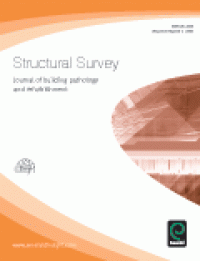Detail Cantuman

Text
Attitudes and approaches of Irish retrofit industry professionals towards achieving nearly zero-energy buildings
Abstract
Purpose
There is profound demand for higher skills and expertise in retrofitting the existing building stock of Europe. The delivery of low- or nearly zero-energy retrofits is highly dependent on technical expertise, adoption of new materials, methods of construction and innovative technologies. Future Irish national building regulations will adopt the Energy Performance of Buildings Directive vision of retrofitting existing buildings to higher energy efficiency standards. Construction industry stakeholders are key for the achievement of energy performance targets. Specifically, the purpose of this paper is to assess the attitudes, approaches and experiences of Irish construction professionals regarding energy efficient buildings, particularly nearly zero-energy buildings (nZEBs).
Design/methodology/approach
Data were collected through a series of quantitative and qualitative methods, including a survey, a workshop and detailed interviews with professionals in the retrofit industry. The structure of this approach was informed by preliminary data and information available on the Irish construction sector.
Findings
There is a substantial amount of ambiguity and reluctance among the professionals in reaching the Irish nZEB targets. The growing retrofit industry demonstrates low-quality auditing and pre/post-retrofit analysis. Basic services and depth of retrofits are compromised by project budgets and marginal profits. Unaligned value supply chain, poor interaction among nZEB professionals and fragmented services are deterrents to industry standardisation.
Practical implications
This study will enable construction industry stakeholders to make provisions for overcoming the barriers, gaps and challenges identified in the practices of the retrofit projects. It will also inform the formulation of policies that drive retrofit uptake.
Social implications
This study has implications for understanding the social barriers existing in retrofit projects. Support from clients/owners has a diverse impact on energy performance and retrofit decisions. Community-based initiatives are key to unlock the promotion of nZEBs.
Originality/value
This paper provides an overview of current activities of retrofit professionals and analyses the barriers, gaps and challenges in the industry.
Ketersediaan
| JTS.EMER.2017.003 | My Library | Tersedia |
Informasi Detil
| Judul Seri |
-
|
|---|---|
| No. Panggil |
-
|
| Penerbit | Emerald Group Publishing Limited : ., 2017 |
| Deskripsi Fisik |
Baik
|
| Bahasa |
English
|
| ISBN/ISSN |
2398-4708
|
| Klasifikasi |
NONE
|
| Tipe Isi |
-
|
| Tipe Media |
-
|
|---|---|
| Tipe Pembawa |
-
|
| Edisi |
vol. 35 no. 1
|
| Subyek | |
| Info Detil Spesifik |
International Journal of Building Pathology and Adaptation, vol. 35 no. 1
|
| Pernyataan Tanggungjawab |
-
|
Versi lain/terkait
Tidak tersedia versi lain











